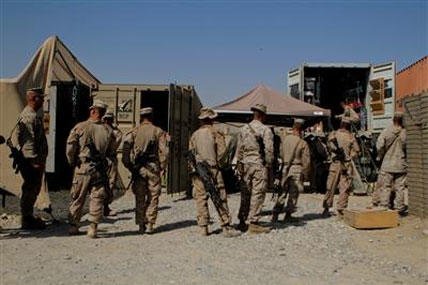FORWARD OPERATING BASE JACKSON, Afghanistan — The mobile exchange is a service civilians might not know about, but to Marines serving in Afghanistan, it is something to look forward to.
The warfighter exchange service team runs the mobile exchange unit, traveling throughout the area and reaching the Marines on the front lines. The truck is a store on wheels, complete with cashier and security.
“We take a 20 foot container and make a store out of it,” said Sgt. Christopher Sherrill, a Marine Corps Community Services noncommissioned officer with Combat Logistics Regiment 15. “We stock the shelves in it like you would see in a regular store.”
Once the container is filled, the Marines travel to different bases throughout the area. The mobile store is stocked with everything including canned food, protein powder, hygiene gear and magazines.
“We bring the stuff of a normal exchange out to the Marines who don’t have access to one,” said Sherrill from Mount Ulla, N.C.
Marines live in a variety of different conditions when deployed. Many smaller bases do not have a store to purchase extra food or supplies from. Sherrill and his team provide the Marines with a store on wheels.
“It fills a gap for the Marines,” said Sgt. Tyler Sylvester another NCO with the team. “Sometimes they don’t have care packages coming out to them, so when we pull up with our truck, the Marines are always happy to see us.”
The arrival of the truck helps build morale for the Marines.
“It’s something to look forward to,” said Lance Cpl. Mark Sullivan, a Marine with Charlie Company, 1st Battalion, 7th Marine Regiment, Regimental Combat Team 6. “I really appreciate any time they show up.”
The size of the base often dictates how long the store will stay. Sometimes it will travel to several bases on the same day, other bases the store will stay for two or three days.
Occasionally the team has been creative to reach the Marines.
“We’ve actually set up our truck outside the wire,” said Sylvester. “There was one time we set up in a local town because the base couldn’t fit us.”
Outside the wire is a military term that means being outside the walls and safety of the base.
The team tries to hit each base every 21 days. The team serves between 1,500 to 2,000 Marines and average 300 to 500 Marines at each base.
“Right now we have six bases that have less than 10 Marines,” said Sylvester. “As long as there is just one or two Marines at a location, we will try to get there.”
The team usually travels by ground convoy between the bases. Improvised explosive devices are prevalent in Afghanistan, but the team focuses on the service they provide to the Marines and not the dangers involved in getting there.
“We are out here to take care of the Marines,” said Sherrill. “That’s what I like about my job. I enjoy helping people.”
The Marines appreciate the truck too, often trying to accommodate the team as much as possible.
Sylvester said they often do not have power or housing when they reach their destination, but the Marines will find them some. He added the Marines bring them chow and water while the team works to keep the truck open. For the Marines, it is one way to say thank you.
Soon the truck will pack up and leave this base. The team will head out to a new location in Helmand province and provide other Marines the opportunity to shop at the traveling mobile exchange.



























